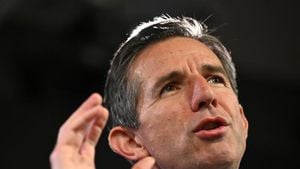Oklahoma Sen. Markwayne Mullin recently found himself at the center of controversy during CNN's State of the Union as he defended Pete Hegseth, the former Fox News host nominated by Donald Trump for Secretary of Defense. Mullin's passionate defense came as Bash attempted to address serious allegations against Hegseth, including a 2017 sexual assault accusation. "Dana, if we’re going to get only one side of the story, let’s not bother," he insisted, interrupting Bash as she read excerpts from the police report related to the case.
The police report alleged sexual assault, which Hegseth has consistently denied, claiming the encounter was consensual. Mullin argued vehemently, stating, "What Pete was saying, what his attorney was saying, was accurate. There was no case here. He was falsely accused!" He cited eyewitness reports claiming the accuser was the aggressor in the situation, asserting, "Pete wasn’t even flirting with her. He was flirting with another girl."
The controversy over Hegseth's nomination is complicated not just by the allegations but also by his background, which raises questions about his suitability for such a significant position. Hegseth has no formal military experience and has been characterized more as a media personality than as someone with the credentials typically associated with leading the Department of Defense. Nonetheless, Trump’s choice seems rooted more in Hegseth's loyalty to the ex-president and his popularity on conservative media than in any qualifications or experience relevant to managing the vast and complex operations of the military.
Critics quickly seized on this aspect of his nomination, with phrases like "indefensible" being thrown around. Many, including Democratic senator Tammy Duckworth—who also has military experience and lost both legs during her service—publicly questioned Hegseth's qualifications to lead the DOD. Duckworth called him “inordinately unqualified” and raised alarms about the possible ramifications of having someone with Hegseth’s profile leading such a pivotal part of the government.
The issue of Hegseth's past is particularly pertinent, as not only does it involve serious allegations but it also intersects with broader concerns about Trump's cabinet selections, which many view as prioritizing loyalty over qualifications. Duckworth's articulate opposition reflects the sentiments of numerous lawmakers who are apprehensive about Hegseth’s potential role, as it brings back discussions around not just his past but the future direction of the military leadership itself.
On the Republican side, many senators rallied around Hegseth. Some argued his approach could inspire the Pentagon and claimed the media attention on the allegations was merely personal attacks seeking to derail his nomination. Senator Roger Wicker of Mississippi stated, "I think he’s going to be in pretty good shape," downplaying concerns around his qualifications and past missteps.
Yet the divided opinion is telling. GOP senators like Mullin and Wicker's upbeat assessments sharply contrasted with concerns voiced by their Democratic colleagues, signaling significant partisan divisions over Hegseth’s nomination. This division reveals not only differences of opinion over the specifics of Hegseth’s qualifications but also larger ideological rifts within the Senate over the direction of military leadership and Trump's influence within the GOP.
The fact remains: Hegseth's nomination carries weighty controversies involving personal conduct and professional competencies, generating fear among some lawmakers about returning to past era policies and beliefs. Critics worry this may influence the military's professionalism and neutrality, especially when it involves issues of alleged misconduct and extreme ideological viewpoints on military policy.
Hegseth's history, which includes public statements against what he termed as “woke” policies, leads many to question whether his leadership would promote inclusion and respect within the ranks of the armed forces. The discussions surrounding Hegseth are not merely about one man’s qualifications: they act as a litmus test for the Republican party’s future values, especially how they shape who leads the nation’s military.
With so much at stake, it seems likely the Senate will see much heated debate as the nomination process moves forward. Will Senator Duckworth, along with her Democratic allies, successfully persuade GOP members to reconsider, or will the loyalty to Trump override concerns about Hegseth’s past and qualifications? This remains to be seen, but the fallout from this nomination could resonate well beyond the confirmation hearing.



